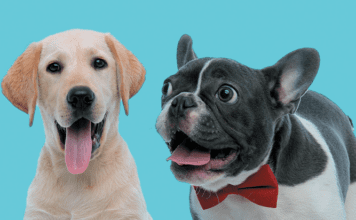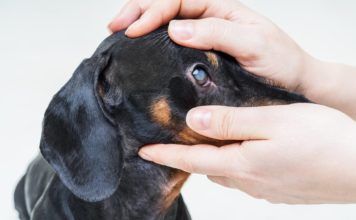Infections and other diseases can also cause canine incontinence
[From Tufts April 2011 Issue]
Although hormonal deficits are the largest cause of canine urinary incontinence, several other conditions have symptoms that can include urinary leakage. Among them are:
Urinary tract infections. Cystitis, bladder stones and other problems in the urinary tract can cause a housetrained dog to begin leaking urine. Other symptoms are blood in the urine, straining to urinate and the passage of very little urine. A urine sample confirms the diagnosis of infection. Treatment consists of a short course of antibiotics. X-rays or ultrasound are needed to diagnose stones. Treatment for stones ranges from dietary changes to surgery, depending on the type, location and size of the stones.
Spring ushers in the scratching season in dogs
[From Tufts April 2010 Issue]
With the approach of warm weather, many owners resign themselves to their dogs intense itching and scratching. Even small skin abrasions can lead to a condition called pyotraumatic dermatitis, popularly known as hot spots. The often painful skin condition is a symptom of an underlying problem.
There are a lot of different triggers for hot spots, but the most common are flea bites, allergies or local humidity changes in the fur, says veterinary dermatologist and Your Dog advisory board member Lowell Ackerman, DVM. Mites, cuts, insect bites, stings or saliva accumulation as a result of chewing can all trigger an inflammatory reaction and cause a hot spot to develop.
My dog’s checkup uncovers a possible cancer
[From Tufts April 2010 Issue]
My dog, a 10-year-old shepherd-husky mix, went for her routine checkup today, and I mentioned that she has been licking her bottom quite a bit. The vet said her right anal gland was blocked and expressed it. Molly growled and lunged, which she did once five months earlier on a visit.
The vet felt two hard masses while expressing the gland. She said they are tumors, and their location is not amenable to surgery. As we spoke, I realized the signs Id been seeing all along added up-increased thirst and urination, flattened ribbon-like feces, occasional difficulty defecating, the continual licking of her bottom, smelly breath.
Put the brakes on bolting out the door for dogs
[From Tufts May 2010 Issue]
You open your front door to accept a package, carefully body-blocking your dog so he doesnt escape. Just as youre closing the door, your mail carrier asks you a question. Distracted, you forget Scooter and open the door to answer. And there he goes. Hes out the door, dashing down the sidewalk before you can stop him. Heart pounding, you rush out to try to capture him before hes injured or vanishes altogether.
Countless hazards lie in wait for dogs running the streets. A client of mine lost her beautiful Belgian Tervuren when her long-line snapped and the dog ran off. She was later found badly injured, hit by a car. Linney died at the veterinarian. A recent news article told of a Pomeranian who, terrified by thunder, darted away from her owner into nearby woods. Early the next morning when a woman was driving to work, a horned owl flew over the road and dropped the hapless dog in front of her car. The driver slammed on the brakes, jumped out and scooped up the little dog just ahead of the owl, who was swooping back for a second grab. Miraculously the dog had only mild injuries and was safely returned to his owner.
If my dog runs off, don’t make a panic grab for him – run...
[From Tufts May 2010 Issue]
What do you do if your dog scoots out the door and calling the Come cue doesnt work? First, dont panic. If you run down the street screaming hysterically after your dog, chances are good hell run farther and faster. Instead, grab the tennis ball, squeaky bunny, tug toy, treats and shrill whistle you keep by the door for just this occasion, step outside, and invite your dog to play with you by running away from him and calling out in a happy voice. Squeak the bunny or blow the whistle to get his attention, and then do your best, Hey, Im having a party and youre invited! act.
Gallbladder Mucocele: A Common Cause of Bile Duct Obstruction in Dogs
A variety of other diseases can affect the gallbladder in dogs
Gallbladder disease is much more common in people than in dogs. The reason: Humans have a very high incidence of gallstones, whereas dogs do not, says Mary Labato, DVM, a specialist in internal medicine at Cummings School of Veterinary Medicine at Tufts University.
However, a wide variety of diseases other than gallstones can affect dogs. In addition to gallbladder mucoceles, these include:
A first-degree burn can heal at home for dogs
[From Tufts June 2010 Issue]
Whether during the drama of a fire or the innocence of a walk, dogs suffer burns just like people do. In summer, they burn their paw pads by walking across hot asphalt streets or parking lots, says Scott Shaw, DVM, a specialist in emergency and critical care at Cummings School of Veterinary Medicine at Tufts University. In winter, they get stuck under radiators in the house, or they go under a car and touch a hot muffler or tailpipe.
Sometimes, too, people accidentally burn them. For example, heating pads left next to the skin can cause burns, when all the person tried to do was keep an older dog warm, Dr. Shaw says. The injury happens slowly, the burn going deeper and deeper. The same thing happens to elderly people.
My Husky Lost His Appetite
The dosage for an antibiotic for my dog?
[From Tufts June 2010 Issue]
Yesterday my dog had his teeth cleaned by a vet, who has prescribed 100 milligrams of Amoxicillin twice a day for 10 days. I am concerned about giving him too much Amoxicillin over that period of time. What is the correct dosage after teeth cleaning?
Two surprising causes of skin problems in dogs
[From Tufts October 2010 Issue]
When your dog has a lackluster coat, flaky skin and hair loss, the cause could be an underlying medical problem. If, however, the condition resulted from his diet, the reason may come as a surprise.
Most problems are associated with feeding low-cost generic diets or home-prepared foods in which balance may be an issue, says dermatologist Lowell Ackerman, DVM, a Your Dog advisory board member. If a well balanced diet is fed, it is rare to see diet-related hair coat problems.
Options on Rehoming a Dog
[From Tufts October 2010 Issue]
It can be challenging to rehome a dog, especially one with major health or behavior problems. Here are options to consider:
Return him to the breeder, shelter or rescue group where you got him. Responsible breeders and adoption organizations contractually require this although some may allow you to rehome to someone you know whom they pre-approve. Caveats: If the place was less-than-reputable - overcrowded and in poor condition - you wont want to return the dog there. If you got him from a pet store or puppy mill (oh, dear), returning is not an option.





